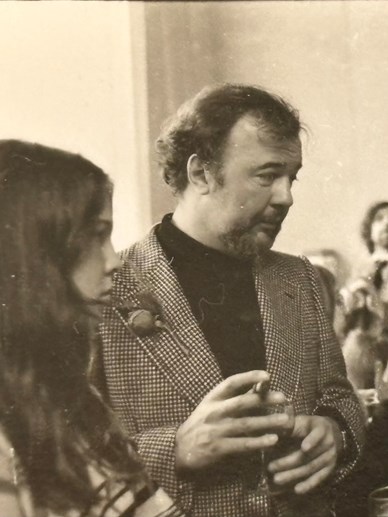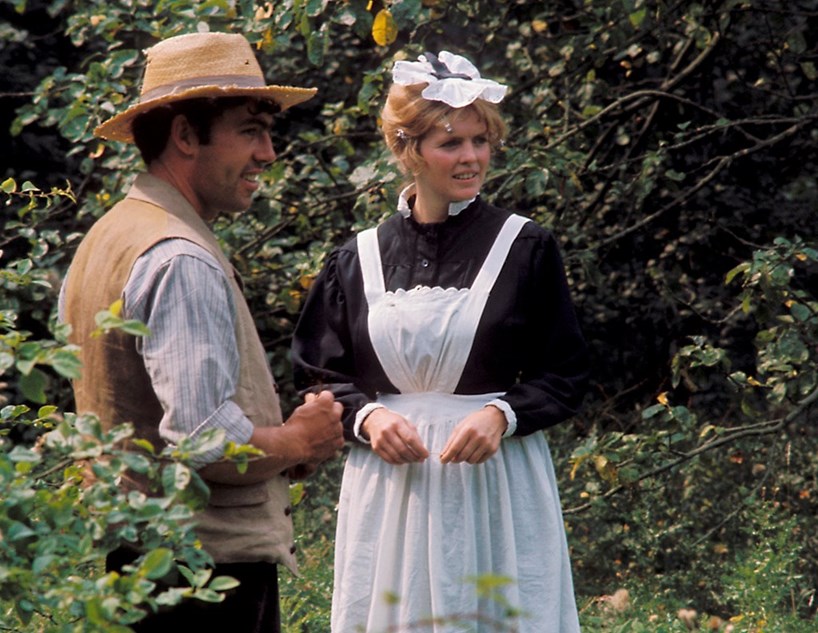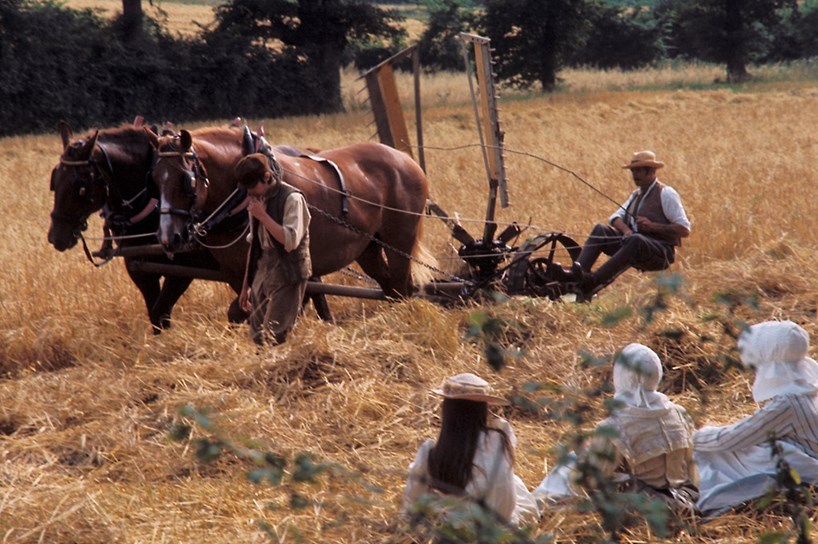AKENFIELD: Portrait of an English village is considered a classic, both as a book (Books, 1 December 2023) and a film — but now Ronald Blythe’s best-known work is set to be a stage play. It is to be produced and performed this autumn by the people of Suffolk in towns and villages throughout the county, and there are plans to take it to theatres in the UK and beyond in 2026.
The project has been driven by Jenny Hall, the daughter of the late Sir Peter Hall, the theatre, opera, and film director, and founder of the Royal Shakespeare Company. His film of Akenfield was screened 50 years ago this year, and she was keen to mark the anniversary.
 Angle FilmsSir Peter Hall with his daughter Jenny, in 1974 at a screening for the cast
Angle FilmsSir Peter Hall with his daughter Jenny, in 1974 at a screening for the cast
After the death of Ronald Blythe in 2023, at the age of 100 (Obituary, 20 January 2023), she approached his estate. “The day after Ronnie’s memorial service, I rang up the executor of his estate to discuss a possible play.” It was met with an enthusiastic agreement, she says. “I understand what a great honour it is, and what a precious heritage we are entrusted with.”
There have always been strong family links to the film: Ms Hall and her brother were extras, her grandfather also had a small part, and she believes that Akenfield was a hugely significant production for her father. Though he had left his childhood home in Bury St Edmunds as soon as he could, Sir Peter felt a strong connection to the county, cherishing his family’s roots here and the rural landscape.
Ms Hall moved to Suffolk seven years ago, shortly after her father’s death, eager to be close to his memory. She has immersed herself in local projects, founding a Shakespeare festival in the small town of Halesworth. It is through her community-interest theatre company, SHAKE, that she is producing the play of Akenfield.
The book relates the joys and hardships of country life from 1880 to 1967, compiled through conversations between Ronald Blythe and his neighbours in a village, near Woodbridge in Suffolk. The 49 voices of ordinary people — horseman, labourer, soldier, teacher, and housewife among them — all present a powerful record of life in a fictionalised setting: names are changed, and a few of the stories are amalgamated. “The ephemeral nature [of theatre] is well suited to this record of a vanishing way of life,” Ms Hall says.
ALTHOUGH Blythe’s work captures a particular moment when the English countryside and its rural community were experiencing seismic change through mechanisation, it has a resonance with the changes in life today in farming, the landscape, and people’s world-view.
“Akenfield was written in a time of enormous change, with the coming of the motor car and the tractor, and the agricultural way of life was disappearing before everybody’s eyes, after millennia,” Ms Hall says. “I don’t think that theatre can solve the world’s problems, or should try to, but I do think it’s very good for people to feel connected, and to laugh and cry together.”
She commissioned her husband, the TV producer and scriptwriter Glenn Wilhide, to write the play. He was familiar with Akenfield, through the family connection. “Oral history is like reading history with the varnish pulled off,” he says. “It’s full of characters we don’t usually hear from, talking about their lives and experiences, telling rich stories. I was very struck when we moved to Suffolk at how current both the book and film are in many people’s eyes.”
And, for his play, he has placed Blythe centre stage. “The play is a portrait of Akenfield through the 20th century as Ronnie writes it: the author is in the process of creating the work over a year.”
 Peter HallThe cast members Garrow Shand and Lyn Brooks in the 1973 film
Peter HallThe cast members Garrow Shand and Lyn Brooks in the 1973 film
Blythe enjoyed a career spanning seven decades, accumulating 45 books of stories, poems, and essays, as well as anthologies, literary criticism, reportage, and social history. Writing from his home at Bottengoms Farm, on the Suffolk-Essex border, he also contributed his “Word from Wormingford” column for the back page of the Church Times each week for almost 30 years.
It is Akenfield with which he is most readily associated. The book has sold more than 400,000 copies in the UK, has been translated into 20 languages, studied in schools and universities in the United States and Canada, and has never been out of print since its publication in 1969.
“Ronald Blythe is a great writer,” his biographer and executor, Ian Collins, says. “He’s been called a village writer, a nature writer, a Christian writer, a literary writer, but he was just a great, great writer.”
Although Blythe didn’t write a play of Akenfield (“Both Ronnie and [Sir] Peter thought you couldn’t do it,” Mr Collins says), this production provides an opportunity for the story to continue. “Ronnie would certainly have said yes to this, and I admire Jenny’s chutzpah.”
SHE has drawn from the strong creative community in Suffolk. The set design and promotional materials have been devised by the sculptor Laurence Edwards, and the lighting has been designed by Paul Cook, whose work has included the Paris Olympics and London’s New Year celebrations. Traditional and original music has been composed by the young folk musician Finn Collinson, who will be playing live on stage with other musicians during performances, and the costumes have been created by film and theatre costume maker Constance Mackenzie.
“Ronnie invited everybody to collaborate and add their voices,” Ms Hall says. “So I’m following his lead.”
 Peter HallA still from the 1973 film
Peter HallA still from the 1973 film
In casting the play, she held readings, reintroducing people to the text before auditioning, and encouraging people to talk about their memories and consider what it was that they cherished about the past, or village life. “We’ve talked a lot, and we’ve got new stories,” she says. “You’d be surprised how much it means to young people. It’s like a past they’re rediscovering.”
True to the spirit of the book and the film, this new stage production is drawing largely on ordinary people, not professional actors, to form the cast. Among them are the singer Andrew Stannard, and Helen Shand — who appeared in the original film, and met her future husband, Garrow, who was playing the starring role, while on set. The young actor James Crawley is taking on the part of Blythe.
The cast of eight is a group of very talented people, Ms Hall says. “They aren’t professional actors, but they are actors in their bones. They’re performers. I remember my father saying ‘Of any group of 20 people together in one room, there will be one who hasn’t forgotten the ability to play.’ Well, I think all of my cast have it. They’re incredible.”
After the previews this autumn at venues throughout Suffolk, there are hopes of staging the play in London, elsewhere in the UK, and overseas. “We think of Ronnie being very English, very Suffolk,” Jenny says, “but they love him in America.”
Akenfield will be performed in Framlingham, Halesworth, Ipswich, Stowmarket, and Saxmundham, between 24 September and 11 October. More information can be found at shakefestival.com. “Akenfield Revisited”, an exhibition telling the story of the book, the film, and the people who made it happen, is at the Food Museum, Stowmarket, until April 2026.
Blythe Spirit: The remarkable life of Ronald Blythe by Ian Collins is published by John Murray (Books, 29 November 2024).














